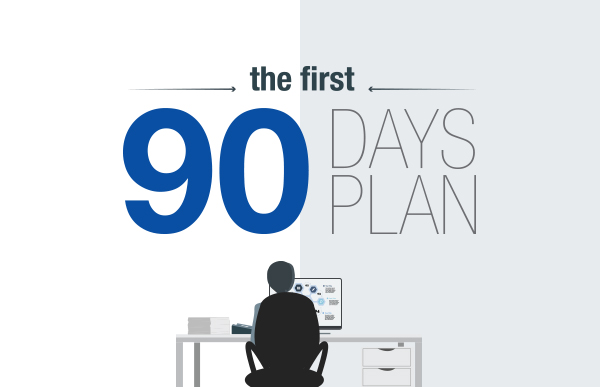The First 90 Days – Part 2: Cultural Alignment Through to Raising the Collective Bar
Intro
How you conduct yourself in the first few months of a new role is critical. This period can have a huge impact not only on how successful you are in settling in, but also on your long-term success.
Managing the balance between delivering in the role quickly, to prove the merit of your hire, against long term strategic decisions can be a challenge, especially the more senior the position is. Knowing who to ask, what to ask and when, without communicating an image of uncertainty and weakness is vital.
The early months in a new role are going to be incredibly important and with so much new information coming at you from different places, possibly at the same time, there is a danger of becoming overwhelmed. Research indicates that those who had a strategy and followed a plan had a smoother transition and felt more in comfortable and in control than those who didn’t.
Using several reference sources including “First 90 Days” by Michael Watkins we have 10 tenets on how to manage your first 90 days in the role. So, to give yourself the greatest chance, here are our second 5 points along with some other thoughts to consider and build into your own plan.
- Cultural Alignment
Although there is a desire to make an impact and deliver on something quickly, you need to recognise that with any transition, especially if it involves a change of company and or sector, there is usually a cultural learning curve, which can be quite steep and not always obvious.
You may know what needs to be done, but to get anything across the line and embedded in, you need to understand the “how.” Understanding how the organisation brings their mission statement and vision to life and the plans the company abides by to reach these core values, can help you avoid making mistakes.
Take the time to learn the firm’s culture by being hyper-observant on how people interact, paying particular attention to the nonverbal cues such as body language. Resist the urge to speak and prove yourself early on, until you have a good handle on how your words and actions could be interpreted, so that you are not sending out the wrong messages.
- Team Building
Building good relationships with your colleagues will be essential to the success and enjoyment you feel in your role. As you will need to work with these people on a daily basis, really put some time in to get to know them firstly on a human level, by making a point of talking about things other than work and listen more than you speak.
Getting to know them on a personal level is incredibly important. Understanding them as an individual will help lay out a strong working foundation so that you effectively interact with them on a professional level later. Becoming comfortable with the people you work with should instantly help you relax and do a better job.
Do not just focus on your immediate team or department, continue to make new connections further afield. By observing how everyone works and collaborates, you will gain valuable insights about the company and group culture.
- Building Connections
When you build key relationships, do not just focus vertically on managers above you, think about your colleagues in other departments and with the people who report to you; you want to create healthy relationships in all directions.
Taking time to meet with those closest to where you are working, can pay huge dividends later. These are the people who can offer you guidance, answer your questions and help you to settle in. However, exercise care in deciding who to listen to and to what degree so that you do not inadvertently alienate others and lose valuable input.
Do not isolate yourself by spending too much time reading and thinking and not enough time meeting and talking; by saying yes to as many opportunities as possible will offer you the chance to meet a wider network of people.
Forming connections and creating alignments with other departments is crucial, if you are tasked with making big cultural or transformational changes where buy in from others is going to be important, this cannot be done without getting out there.
Build credibility. Your early actions will have a huge influence on how you are perceived. Build a reputation through action rather than talk and ask people what they expect from you or how you can help them.
- Self-management
Key to succeeding in a new role is believing in yourself. There will be ups and there will be downs, and mistakes will be made as you adjust and acclimatise. Treat every negative situation as a learning experience, but do not dwell and allow this to derail you.
Accept that the skills, knowledge and experience that helped you perform well in your last role will not necessarily make you successful in your current role, there may be new skills that you need to develop and hone. In these initial stages you need to recognise that you will be operating outside your comfort zone as you get up to speed in those areas.
Get organised, set good habits, discard old or bad ones but do not worry if you do not end up following your strategy to the letter. So, as you gain more knowledge, tailor your plan and if you have to course-correct as you go, that’s okay.
Think about your personal brand and the image you want to portray. You know people will judge you but by taking control, you can influence them on what judgements you want them to make, so that you are judged in the way you want to be.
- Raising the Collective Bar
Towards the end of the 90 days, you should have a good understanding of what is expected of you, how the role fits into the wider company strategy and a firm grasp of the culture. So now, if you have not already, where you identified opportunities to implement change, start implementing those plans and allow these to develop into long term goals.
Whilst short term tactical goals have got you through the early months, take some time to now think about some of your longer-term objectives; where do you want to be in six months’ time and what does success look like? What’s going to be important going forward for you and your boss? How can you continue to add value and not only benefit the team but the company as a whole?
Summary
To a large extent your first 90 days in your new role will be inextricably linked to the time and effort you put in.
By preparing ahead you can lay down a solid foundation, allowing you to absorb as much information as possible in the most effective way, thereby equipping you to succeed. Taking the initiative, challenging yourself and getting out there and involved will reassure others that you are serous and securing an early win is a great way to make a positive impact.
By doing the above in a way that is congruent with your values and beliefs will position you well for greater success, with those first 90 days flying by. Before you know it, you will be firmly established and, in all probability, welcoming others into the organisation as an “old hand”.
To view part 1 of this article, or if you found this article useful, please review our past posts and articles on our LinkedIn page or our website.

